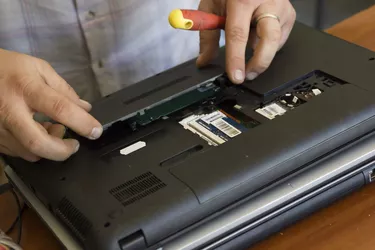
Losing the use of your computer is always a real possibility. Computers sometimes appear to be intact but no longer work due to internal damage, the nature of which is often unknown. When a computer is damaged beyond the possibility of affordable repair, those with business, homeowners or renters insurance can file claims on these losses, but how the claim is filed will be important in determining the final outcome.
Step 1
Engage an expert to perform a forensic examination on the computer to determine and document the cause of the damage. A forensic examination meets legal standards as to the qualifications of the examiner and the thoroughness of the examination, and can be introduced as evidence in court if required. Many PC repair shops and technicians are qualified to conduct forensic examinations.
Video of the Day
Step 2
The most common causes of catastrophic damage to personal computers are electrical anomalies and power surges. If an electrical problem destroyed other electronics in your home, such as televisions and microwave ovens, you will have a stronger case for filing a claim on homeowners insurance. Talk to your neighbors and find out if they also suffered a recent electrical "blow out." It might be possible to trace the problem to a fault on the part of your local power company. Your insurance agent will want to know this.
Step 3
Ask your computer expert shop to write a report on letterhead outlining the damage done to the PC and identifying the likely causes. The report should also explain why repair of the damage would be either impossible or financially unreasonable. Make sure the repair technician provides his professional credentials and contact information in this letter.
Step 4
Ask the repair technician to provide a "fair market value" for your computer, based on its year, make and model, as well as a "replacement value." Your insurance agent can advise you which "value" is covered. Do not be surprised if your computer is not worth very much in terms of "fair market value" or if the insurance company only agrees to replace your computer with a comparable used or refurbished computer.
Step 5
Forget about filing claims for the value of lost hard drive contents on strictly personal home computers; most insurance companies do not allow these kinds of claims unless you carry special computer data protection coverage. If you have business insurance, you might have this coverage. But be prepared to explain why you did not make and keep backups of this important data.
Step 6
Do not include the replacement cost of software titles on the damaged computer. Insurance companies do not generally cover this type of loss, regardless of the value of the programs to you. You are expected to own and keep copies of your software program installation disks for reloading.
Step 7
Consider your homeowners insurance deductible amount. If your deductible is $500, for example, your insurance company will not be paying for replacement of your computer. You will, because modest desktop and laptop computers cost less than $500. You should expect to receive claims money only if you lost more than one computer or other electronics.
Step 8
Do not delay filing a claim. If you discover the damage on Wednesday night, you should take the computer to the shop Thursday morning, get a diagnosis by Friday, and file a claim with your insurance agent on Monday. Prompt attention tends to give credence to your claim.
Video of the Day